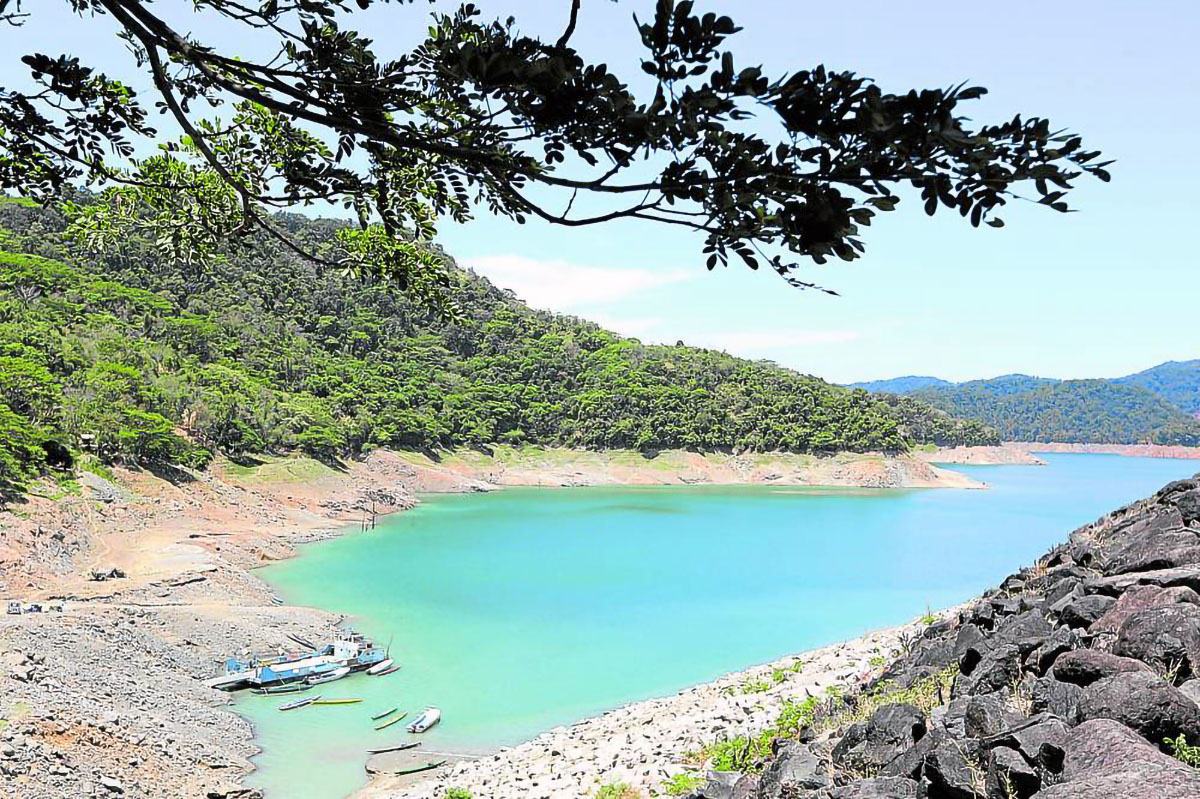
GOING DOWN Photo shows the receding water at Angat Dam, which is nearing its minimum operating level of 180 meters on May 7. NIÑO JESUS ORBETA
MANILA, Philippines — The government assured the public, particularly those living in Metro Manila and its environs, that there wouldn’t be any supply cuts as it has reduced the allocation for irrigation in anticipation of domestic consumption needs.
Environment Undersecretary Carlos Primo David said the National Irrigation Administration (NIA) would receive 1 cubic meter per second (cms) less for irrigation use.
“Nevertheless, even if we cut it by 1 cubic meter per second, there will still be no interruptions because we are now working with NIA in terms of how much water it needs on a particular day or week,” David told the Inquirer on Friday.
READ: Water firm reduces off-peak supply flow
David said they will convene by May 15 to determine whether to retain the 50-cms allocation to the Metropolitan Waterworks and Sewerage System (MWSS) or reduce raw water being sourced from the Angat Dam.
The National Water Resources Board (NWRB) had decided to leave the 50-cms allotment unchanged for the MWSS from May 1 to May 15 to meet the increasing demand for water amid the extreme hot weather.
To maintain that allocation, David explained they had to slash the irrigation allocation, but NIA is expected to need more from Angat Dam next month in view of rice farmers’ contract-growing schemes.
The NIA has a contract-growing program wherein rice farmers who received various interventions from them, such as seeds and fertilizers, to sell their crops to the agency.
“I have to allocate some water also for them even until June when the dry season is expected to end. They will be given water from Angat Dam until June, for some areas that they contracted for the farmers to grow,” he added.
Main source
Angat Dam is the main source of water for Metro Manila and nearby towns, both for domestic use and irrigation, supplying around 90 percent of the water requirements of these areas. The raw water from Angat is released to the MWSS and NIA.
Water concessionaires Manila Water Co. Inc. and Maynilad Water Services Inc. split the allocation given by the MWSS, with Maynilad getting a bigger share because of its larger customer base.
Manila Water earlier said it would still lower water pressure coming from faucets during off-peak hours or from 10 p.m. to 4 a.m. to help extend the limited supply.
Maynilad said it could lower water pressure to help manage water consumption, but no service interruptions would be implemented in its coverage area except for scheduled and emergency maintenance activities.
Below normal water levels
As of Saturday, Angat’s water level is 183.67 meters, lower than the 183.99 meters recorded a day ago, according to the Philippine Atmospheric, Geophysical and Astronomical Services Administration (Pagasa).
The current level is below the normal or comfortable water level of 212 meters yet is inching closer to the minimum operating level of 180 meters.
On Thursday, Pagasa said that while the El Niño phenomenon is already waning, it may still cause drought in 47 provinces by the end of May.
“The rainfall forecast for the month suggests that below-normal rainfall conditions will likely be experienced in most parts of Luzon and Visayas, while near-normal conditions are expected mostly in Mindanao and the northern portions of Luzon. However, the probability for below-normal conditions is still high,” Pagasa said in an advisory on Wednesday.
The weather bureau said droughts can still happen in the Spratly Islands, Abra, Batangas, Benguet, Camarines Norte, Camarines Sur, Catanduanes, Cavite, Ifugao, Ilocos Sur, Isabela, Kalinga, La Union, Laguna, Masbate, Metro Manila, Mountain Province, Nueva Ecija, Nueva Vizcaya, Occidental Mindoro, Oriental Mindoro, Palawan, and Rizal.